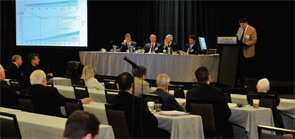Dr. Berke said other claims are also misleading, including the National Research Council’s observation that the longevity of U.S. residents is lower than that of residents of other wealthy nations, due to smoking. When the data are adjusted for motor vehicle accidents and homicides, the U.S. “just about leads the world in longevity,” he said. He added that this is especially striking given the obesity epidemic in the U.S.
Explore This Issue
February 2011“Statistics like these are also skewed by the fact that we are a very large, diverse country, with very diverse cultural and economic demographics, so that broad generalizations are often not that informative,” Dr. Berke said.
Similarly, the Organisation of Economic Co-operation and Development has found that the survival rates are best in the U.S. for 13 of the 16 most common malignancies, as well as for myocardial infarctions.
“We don’t often hear about these laudatory comments in our health care, but these facts are obviously appreciated by persons from many other countries who come here to receive their care for serious illnesses,” he said.

New Technology
Although they’ve increased costs, technological advances have obviously been beneficial. Sinus surgery, he noted, used to be done by open procedures and “mostly by feel with little visualization” before the arrival of miniaturized scopes and cameras.
Improvements in care can be easily imagined, he said, even though they might involve increased costs.
“If one projects our present understanding of the neurovascular microanatomy, anti-rejection medication, therapies for malignancies and understanding of the genome,” he said, “I can dream of a time in the near future—let’s say 25 years—when patients with advanced disease states of the larynx, tongue and pharynx could have the organs removed, kept viable in vitro by extracorporeal perfusion, repaired or treated by high-dose chemotherapy or radiation without systemic side effects and then microvascularly reimplanted in the body and selectively reinnervated. Possibly even a new organ could be grown in culture to replace the diseased one.”
The Congressional Budget Office believes that certain more costly technologies and services will have to be limited in favor of cheaper services, even though outcomes research has shown that those services are often inferior, Dr. Berke said.
The progress made in medicine is coming back to haunt the industry, he said. “In some respects, we are being unfairly blamed and are paying the price today, and will pay even more tomorrow, for having been so successful in increasing longevity and maintaining quality of life,” Dr. Berke said.
Leave a Reply